EcoFlow River 3 UPS review: Downsizing power without compromise
Keep the juice flowing with EcoFlow’s latest travel buddy
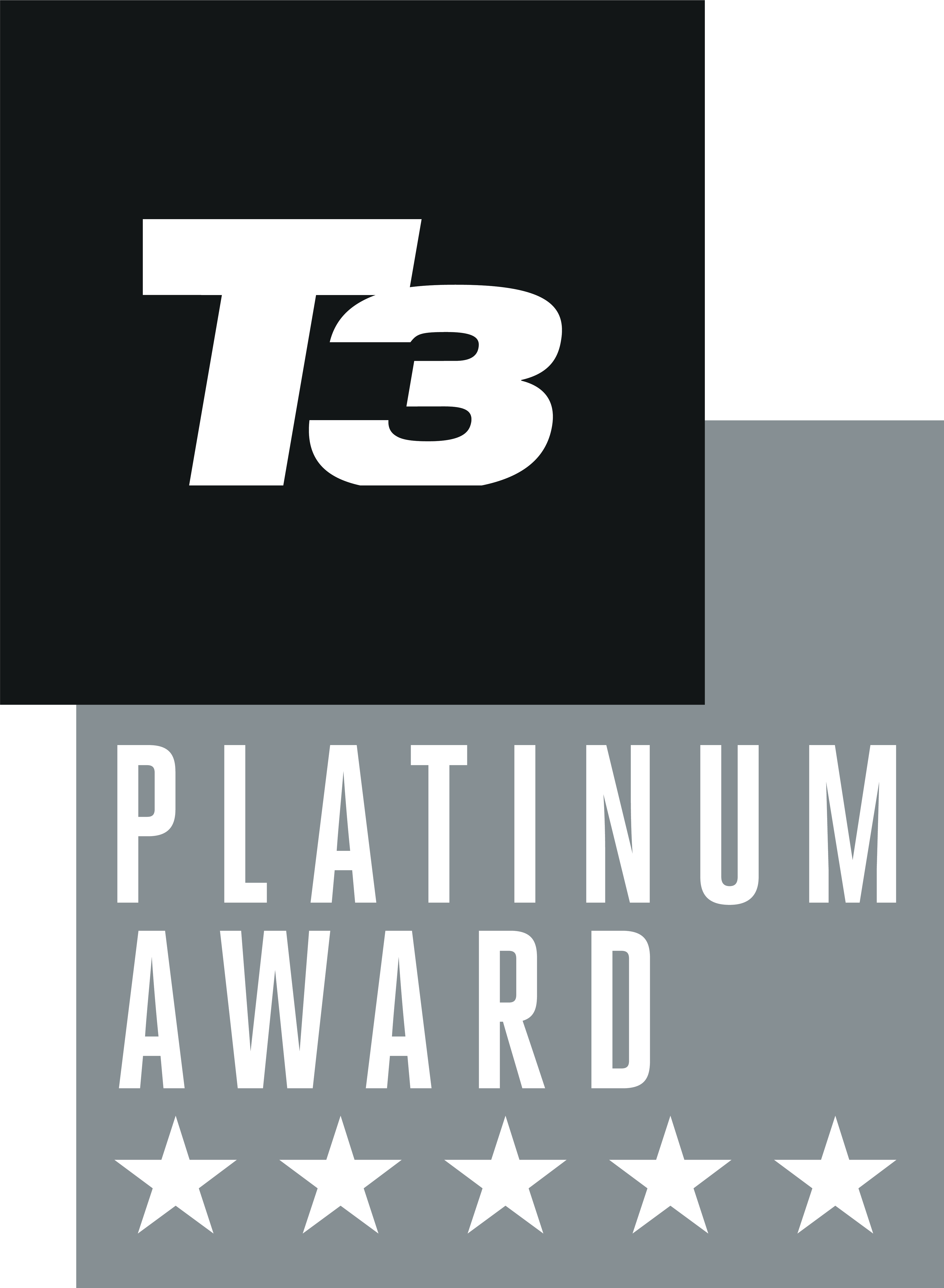
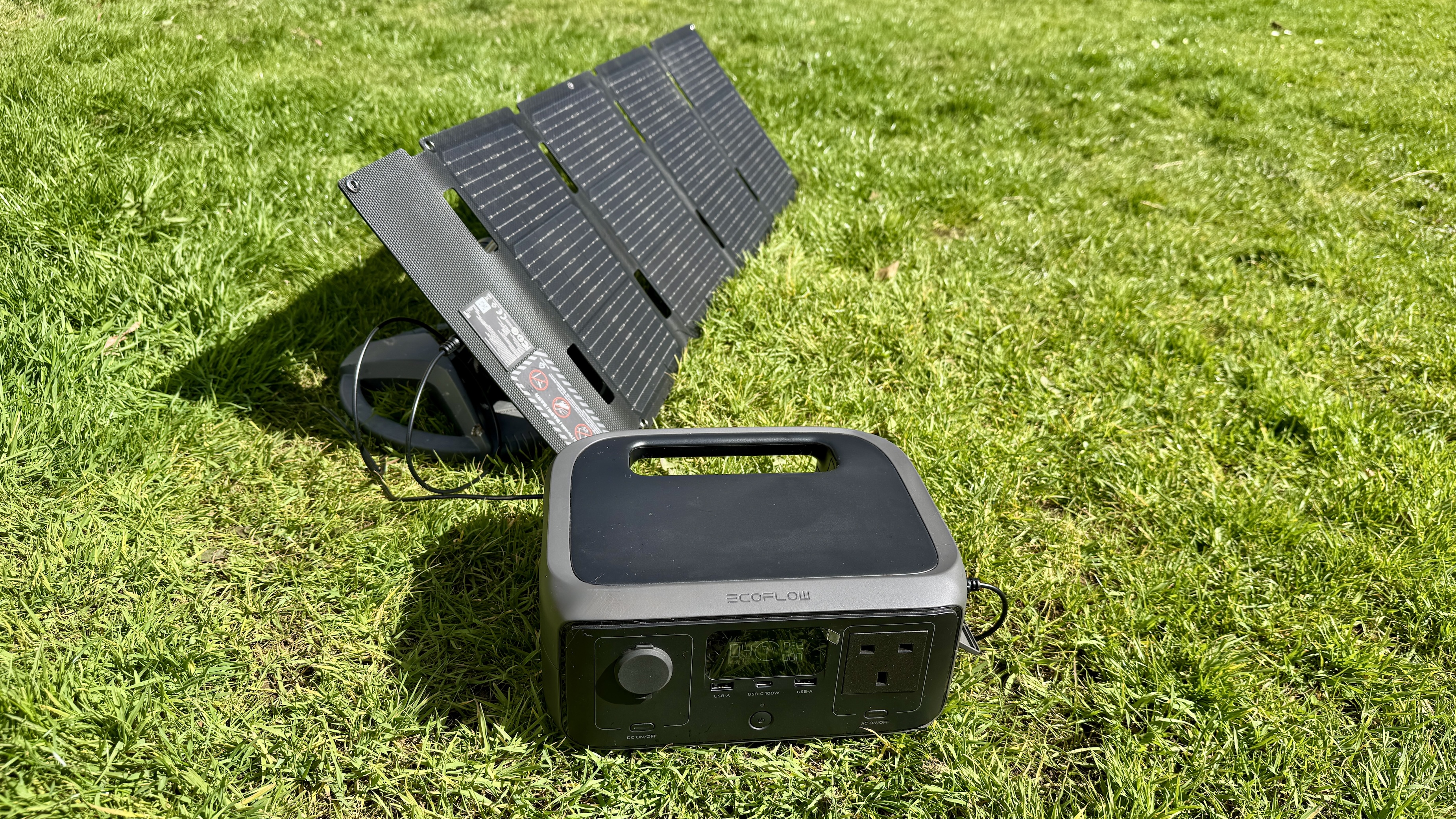
The small but perky EcoFlow River 3 UPS portable power station punches way above its size, weight and price point, making it an exceedingly reliable choice for those needing a lightweight power solution for both short-term outdoor use and home emergencies. Unreservedly recommended.
-
+
Ultra compact and light
-
+
300 watts of power
-
+
Perfect for light use
-
+
Ideal for UPS backup
-
+
Great price
-
-
Not powerful enough for larger appliances
Why you can trust T3

Welcome to our review of the EcoFlow River 3, a plucky little 300-watt portable power station that’s designed to deliver reliable electricity wherever and whenever it's needed. Compact and powerful, this little cutie features fast charging, multiple output options, and 300 watts of oomph all wrapped up in a sleek, minimalist design.
To all intents and purposes the River 3 is the perfect sized power station for most people, whether it’s being used to power a multitude of camping accessories – including phones, laptops and tablets – charging power tools and drone batteries on the go, or keeping the lights, TV and internet on during a power cut.
In fact, I recently wrote an article on why I think that smaller is best when it comes to portable power stations, and this is just the kind of model I’m talking about.
Let’s dig a little deeper into the workings of this clever little sausage and see if it’s the best option for you.
EcoFlow River 3 UPS review
Price and availability
If you live in the UK, you can grab yourself a River 3 UPS for a very reasonable £249 or the River 3 Solar bundle with 45W portable panel for £319. Both options are available direct from the EcoFlow website. Alternatively try Argos, Screwfix or B&Q where the main unit is shifting for the same price.
Live in the US? Head straight to EcoFlow where the River 3 is currently retailing at a knockdown $179. Incidentally, the US version comes standard with built-in UPS and two AC inputs (one 3-pin, the other 2-pin) because, well, US plugs are much smaller than British ones.
If you want to add the 45W solar panel, figure in laying down $219. Otherwise visit Amazon where the same model retails at $159 and $199 with 45W solar panel. By the way, if you want a higher-spec solar panel, you can always opt for a 60W or 100W panel instead.
Design and features

For purposes of this review, EcoFlow sent me the River 3 UPS and a small foldable 45W portable solar panel that forms part of a bundle. You can read more about the accompanying solar panel below.
At this juncture I should add that the River 3 itself is available in two main variants – standard and UPS. I would forget about the standard model altogether because it can’t be used as emergency backup in the event of a power failure. Instead, head straight for the UPS (Uninterruptible Power Supply) model which costs a paltry £10 more. A no brainer in my opinion.
Right out of the box, the EcoFlow River 3 UPS impresses with its modern, minimalist matt black design. At just 3.55 kilos in weight (7.8 pounds in old money), 25.5cm in width, 21.2cm in depth and svelte 11.3cm in height, this diminutive toaster-sized tyke is compact and light enough to easily carry in one hand – and for a fair old distance to boot. And because its centre of gravity is so low, there’s zero chance of ever knocking it over.
The River 3 UPS ships with a reassuringly safe 245Wh LiFePO4 battery which promises up to 3,000 charge cycles before it drops to 80% capacity. That’s well up there with the very best. With a continuous output of 300W, the River 3 UPS can handle an impressive range of devices, including laptops, smartphones, cameras and even some power frugal appliances like mini fridges and fans.
However, while the River 3 UPS sports a peak surge output of 600 watts when using its EcoFlow’s X-Boost technology, this extra power is only designed for the higher electricity draw that’s usually required when powering up some high-wattage devices. Hence, appliances like hair dryers, electric grills and most heaters bar the very smallest desktop variety will most certainly push it beyond its limits.
For those who need more power, this model’s stablemate – the River 3 Plus – offers a higher capacity of 600W with a peak surge of 1,200W, so perhaps consider that model if you think you’ll need higher capacity. Nevertheless, for everyday use, the base model we’re looking at here should be more than enough for most users.

EcoFlow has equipped the River 3 UPS with an impressive variety of ports: one UK-spec AC outlet (300W total with 600W surge); a single USB-C port (up to 100W); two USB-A ports (12W max per port); and a 12V car outlet. This mix allows you to power everything from a MacBook Pro to a CPAP machine without hunting for adapters.
Additionally, this power station features Wi-Fi and Bluetooth connectivity, enabling remote monitoring and control via the excellent EcoFlow app, but more on that below. Nestled in-between all the outputs is the unit’s bright and crisply sharp LCD screen which offers real-time information on battery life, input and output power usage and estimated running time.
The EcoFlow River 3 ships with an AC charging cable and 12v car charging cable, and that’s about all you need for power on the go and emergency backup in the home.
45W solar panel
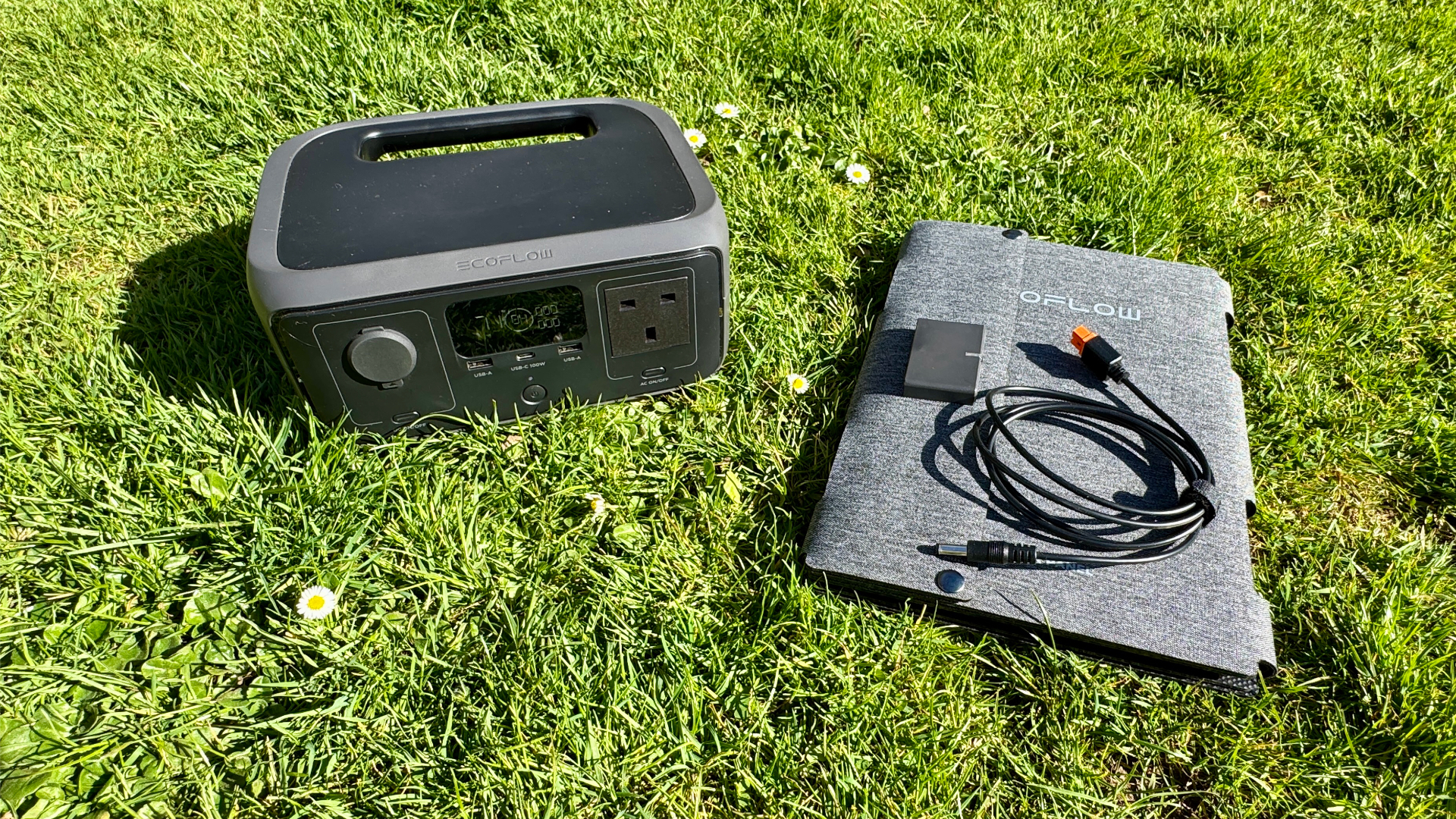
As mentioned above, EcoFlow also sent me its 45W solar panel and it’s the dinkiest and most portable panel I’ve ever laid eyes on. In fact, when folded and secured using its two press studs, it measures just 22.2 x 30.9 x 4 cm and weighs a meagre 1.4kgs, which means it’s a doddle to transport on foot, on a bike or in a car. When unfolded, this panel measures 98 x 30.9 x 1.6 cm.
However, it doesn’t have an integrated stand of any kind so you will need to prop it up against something or use the provided carabiner clips to hang it from a tree, the rear of a pickup or the side of a tent. The lack of a pull-out stand is a bit of an oversight in my opinion, since it makes it quite tricky to adjust this panel’s angle to the sun – and it’s all about angles when it comes to extracting maximum efficiency from a solar panel of any kind.
This 45W model is equipped with TOPCon solar technology and has an efficiency of up to 25%, which may not sound a lot but is actually a mite better than many other portable panels. On the plus side, its PCB fibreglass and durable ETFE coating provide an IP68 rating, which means it can handle some rain without issue.
The EcoFlow 45W is connected using the supplied DC5521 to XT60i charging cable, and there’s a USB-C connector built in for separate charging of phones and laptops. It also comes with four carabiners to hang it up.
EcoFlow app
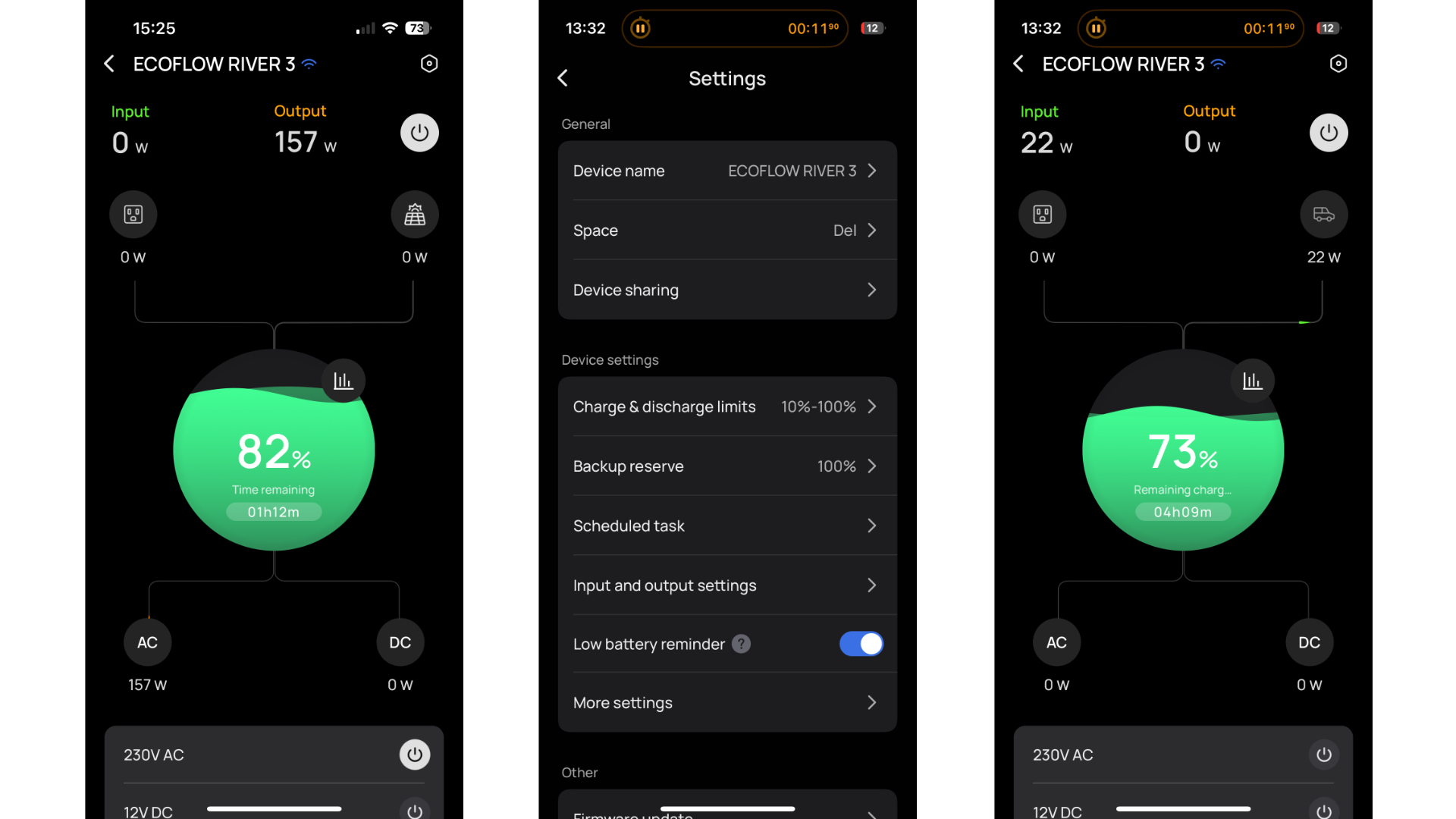
I reckon that EcoFlow’s app is the best on the market. It’s easy to use and I love the fluid-like animation on the home screen whenever it’s drawing or delivering power. This app lets you adjust charging speed, monitor power usage, adjust ‘auto timeout’ for UPS use and set up charge and discharge limits. However, like every other portable power station I’ve tested, you can’t turn the River 3 UPS on remotely unless it’s already on or the setting has been changed to ‘never’ in the app’s ‘device timeout’ menu.
Performance
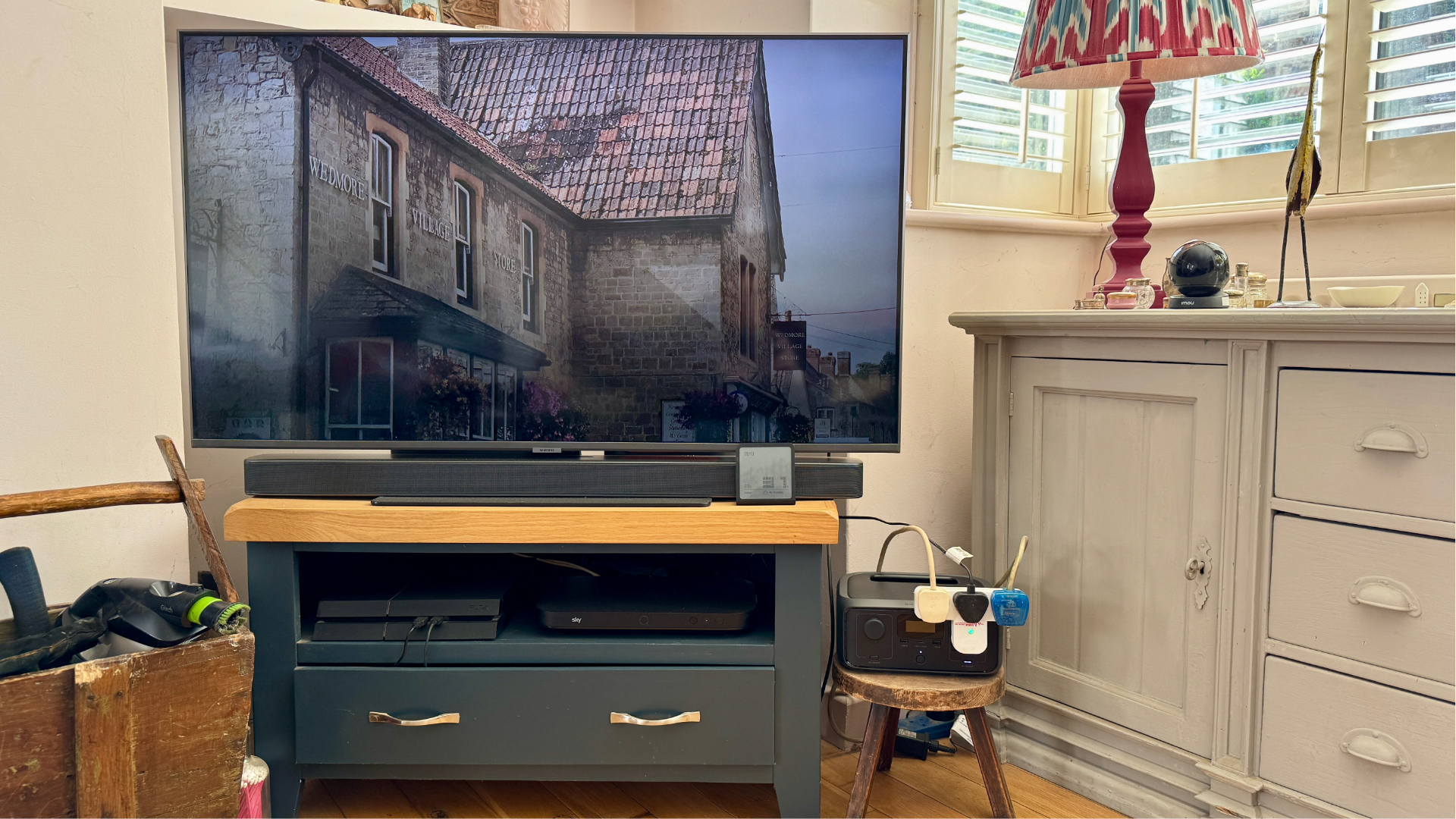
The EcoFlow River 3 UPS backs up my entire TV system with room to spare. And with zero fan noise, to boot
I’ll cut straight to the chase and say that I’m rather smitten by this little bundle of joy. It’s just such a perfect size for travel and home use as a UPS. And that means it can be used all year round instead of sitting in a cupboard doing nothing.
Although I haven’t gone on any camping trips lately, I can envisage a lot of things this model could be used for. For starters, it’ll keep all your mobile devices topped up on a regular basis and quickly charge all your drone batteries, torches and tent lights. It will also power an electric air pump, including today’s more powerful models designed for inflatable tents and paddle boards. Hell, it’ll even manage a 300W camping kettle, though I’d personally stick to good old gas for that. If used in conjunction with the optional 45W solar panel, this PS should theoretically provide enough off-grid juice for a lengthy wilderness camping stint.
For anyone considering a power station for home backup, the River 3 is a sterling choice, mostly because it’s small enough to be easily positioned next to the appliance or appliances you want backing up. If the grid goes down, it switches to battery power in less than 20 milliseconds, ensuring that crucial devices like WiFi routers and even important medical equipment remain powered without interruption.
Aside from normally keeping my whole WiFi system backed up for several hours in the event of a power failure (I live in the countryside so have already experienced five failures in the past two years), I have also tested the River 3 UPS with my TV system comprising a Samsung Q 50-inch TV, JBL soundbar, Sky Q box and a side light running a Philips Hue bulb. This amounted to 157 watts max (about 1.5 hours of TV when fully charged), and the River 3 UPS still had loads of headroom to add a PS4 and some extra lights. Although the fan ramped up when I first plugged everything in, it soon stopped whirring altogether and remained silent during use – and that’s a massive bonus when you’re watching TV with the volume low.
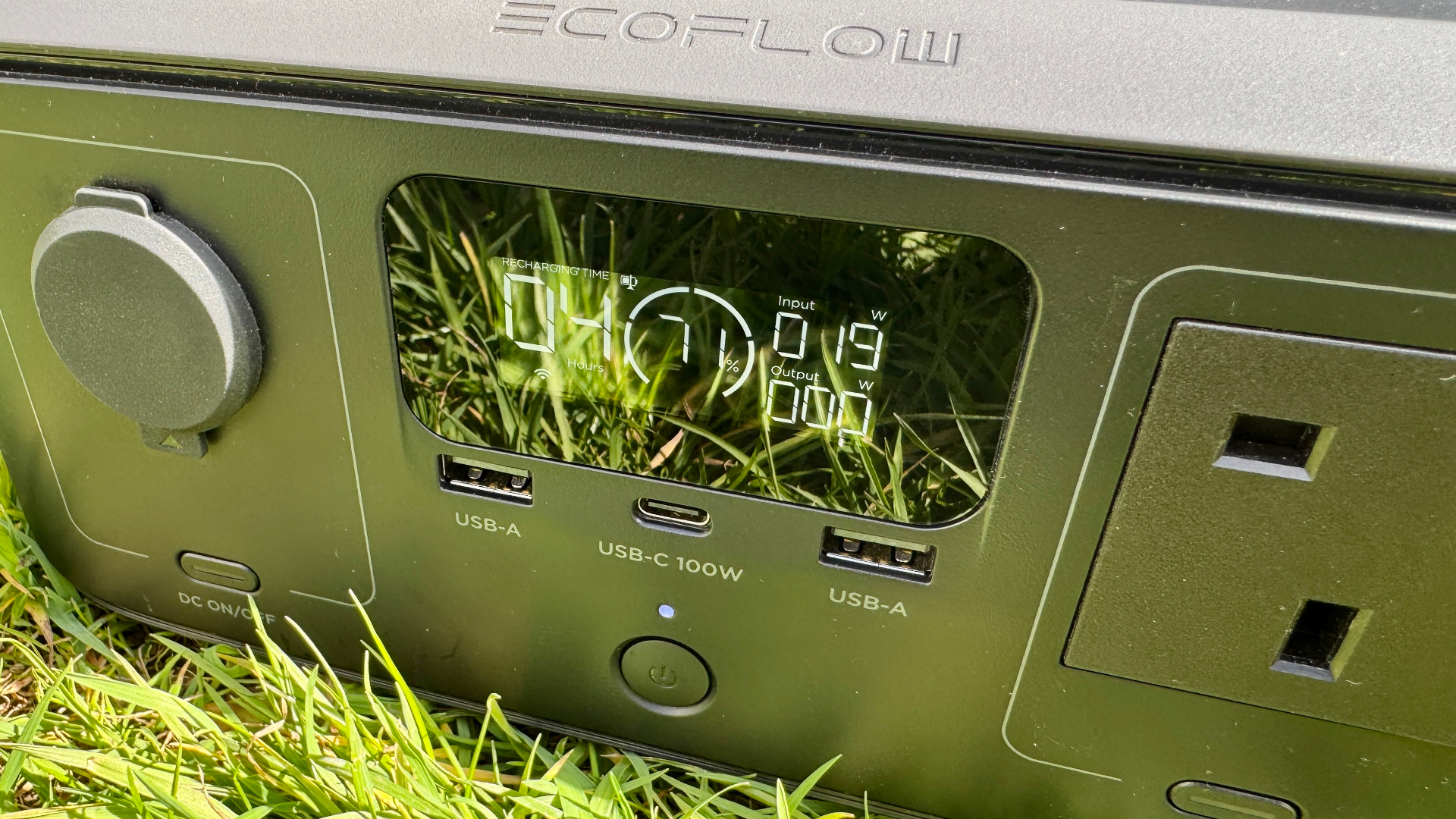
I then took the River 3 UPS outside and set up the provided 45W solar panel using the unit and two garden sprinklers to prop it up (not ideal, it must be said). I then reached for my favourite empty toilet roll (yes, you read that correctly), placed it up against the panel and adjusted the panel’s angle to the sun so the toilet roll cast as little shadow as possible. I then grabbed the solar charging lead and connected the panel to the River 3 UPS.
It took about two and a half hours to take the River 3 UPS from 70% to 84% and the maximum efficiency I got was 21%. Given that typical efficiency for portable solar panels ranges from 15% to 20%, a reading of 21% wasn’t too bad. I should add that there was some high cirrus cloud adding disruption to the sunlight so I would hope that a midsummer’s day with full sun would easily take it to its 25% efficiency threshold.
I know what you’re thinking right now: ‘why just 25%?’. It’s the nature of the beast, I’m afraid, and one reason why solar isn’t necessarily the best way out of the fossil fuel crisis we’re in. Nevertheless, from a camping point of view, 25 percent is better than no percent at all. It can be the difference between having zero phone battery when you most need it and enough of a charge to make vital contact with civilisation.
Verdict
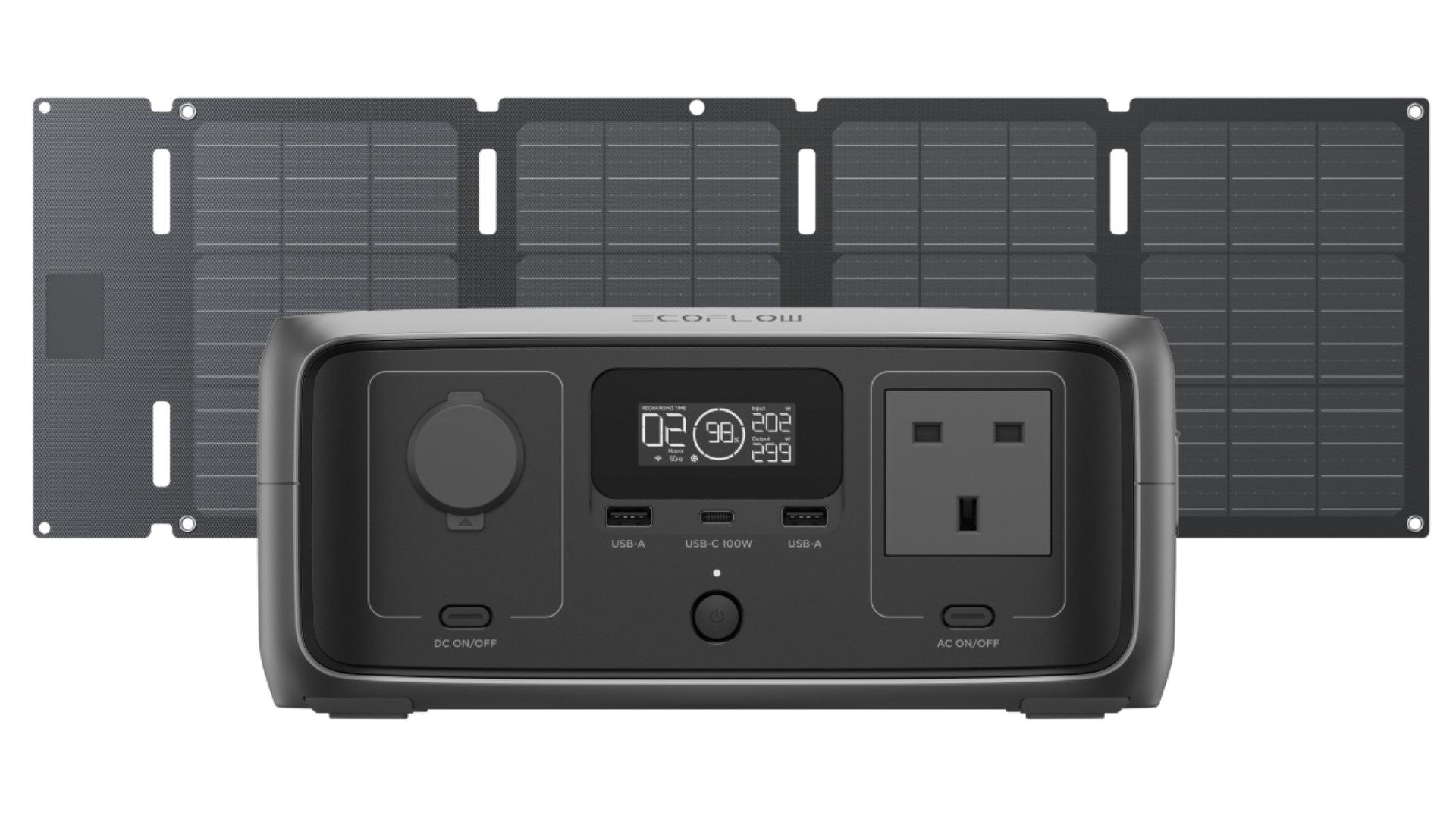
The EcoFlow River 3 UPS strikes a fantastic balance between portability, power and convenience. It’s genuinely small and light enough for most outdoor scenarios and absolutely perfect for localised emergency backup of WiFi, lights, TV and vital medical devices. If you need an easy-to-carry, fast-charging and feature-rich power station, this model is absolutely worth considering. No, it won’t comfortably power anything above 300 watts, but for most of us, it really does hit the sweet spot.
Sign up to the T3 newsletter for smarter living straight to your inbox
Get all the latest news, reviews, deals and buying guides on gorgeous tech, home and active products from the T3 experts
Derek (aka Delbert, Delvis, Delphinium, Delboy etc) specialises in home and outdoor wares, from coffee machines, white appliances and vacs to drones, garden gear and BBQs. He has been writing for more years than anyone can remember, starting at the legendary Time Out magazine – the original, London version – on a typewriter! He now writes for T3 between playing drums with his bandmates in Red Box (redboxmusic).
You must confirm your public display name before commenting
Please logout and then login again, you will then be prompted to enter your display name.
-
 One of Android Auto’s interesting new features has disappeared again
One of Android Auto’s interesting new features has disappeared againHopes are dashed of an exciting Android Auto feature - or are they?
By Chris Hall Published
-
 Motorola’s open earbuds could bring the bling and Bose sound
Motorola’s open earbuds could bring the bling and Bose soundMotorola is preparing to launch its first open earbuds and a new smartwatch too
By Carrie Marshall Published
-
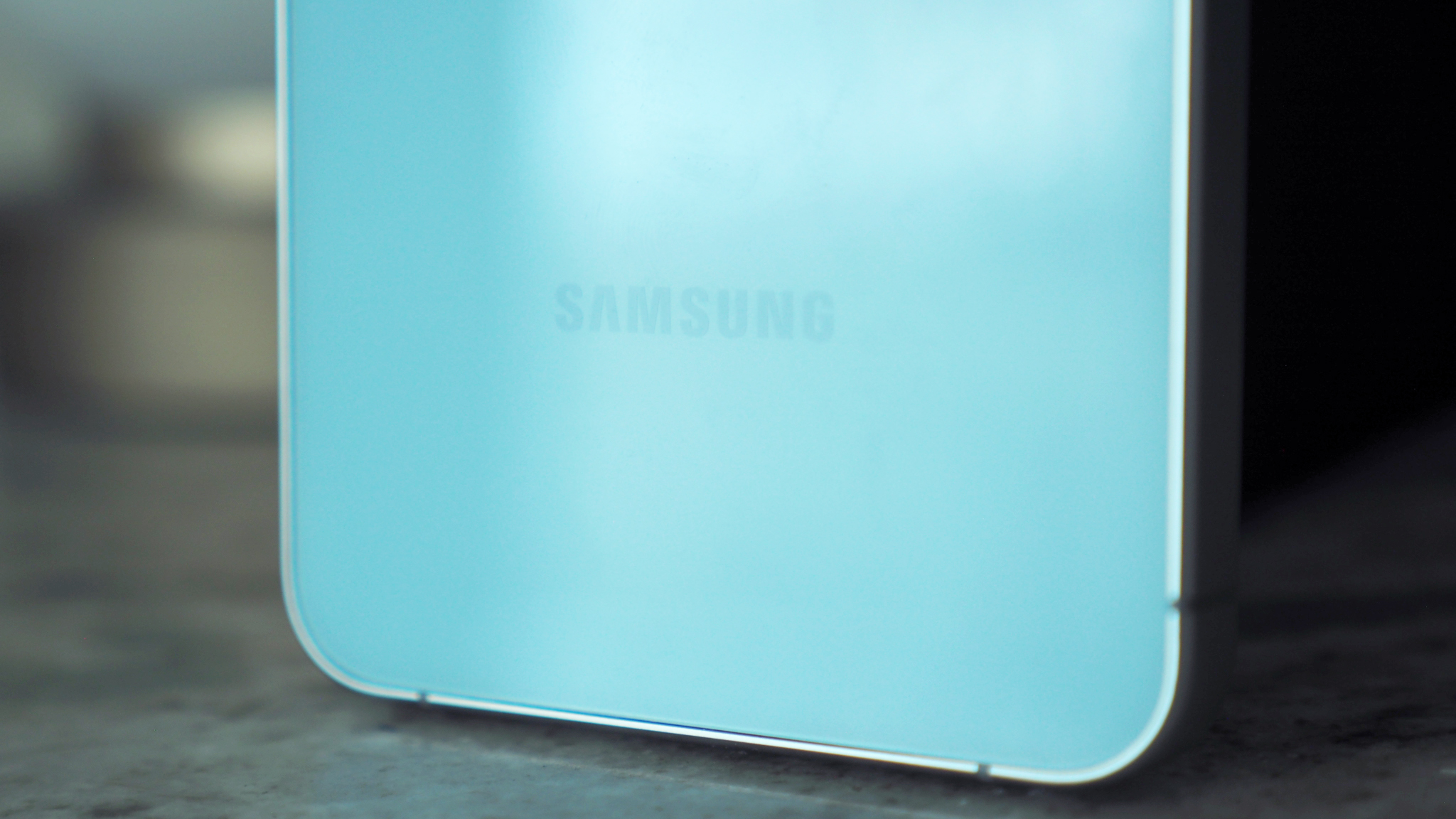 Samsung Galaxy S25 FE still on for this year, but one leak curbs our excitement
Samsung Galaxy S25 FE still on for this year, but one leak curbs our excitementThis is an odd choice
By Sam Cross Published